Related Research Articles
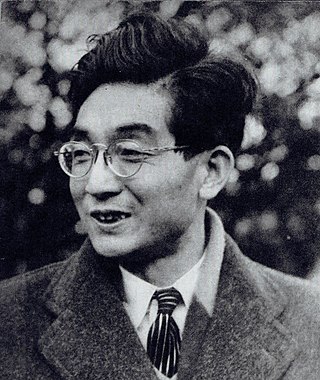
YoshitarōNomura was a prolific Japanese film director,film producer,and screenwriter. His first accredited film,Pigeon,was released in 1952;his last,Kikenna Onna-tachi (危険な女たち),in 1985. He received several awards during his career,including the Japanese Academy Award for "Best Director" for his 1978 film The Demon.
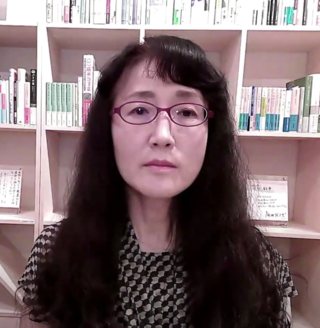
Miri Yu is a Zainichi Korean playwright,novelist,and essayist. Yu writes in Japanese,her native language,but is a citizen of South Korea.
Japanese South and North Koreans comprise ethnic Koreans who have permanent residency status in Japan or who have become Japanese citizens,and whose immigration to Japan originated before 1945,or who are descendants of those immigrants. They are a group distinct from South Korean nationals who have immigrated to Japan after the end of World War II and the division of Korea.
Yōichi Sai was a Japanese film director. He was the president of the Directors Guild of Japan.
Yangji Lee was a second generation Zainichi Korean novelist born in Nishikatsura,Yamanashi,Japan. When she was in grade school,her parents acquired Japanese citizenship and her nationality became Japanese at that time. Upon naturalization,she adopted the name Tanaka Yoshie.

Shin'ichirōNakamura was a Japanese author.

Sakhalin Koreans are Russian citizens and residents of Korean descent living on Sakhalin Island,who can trace their roots to the immigrants from the Gyeongsang and Jeolla provinces of present-day South Korea during the late 1930s and early 1940s,the latter half of the Japanese colonial era.

Japanese people in Russia form a small part of the worldwide community of Nikkeijin,consisting mainly of Japanese expatriates and their descendants born in Russia. They count various notable political figures among their number.
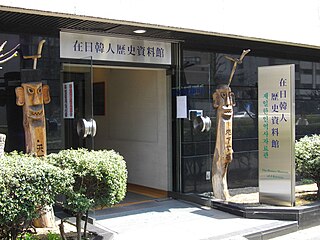
Zainichi Korean is a variety of Korean as spoken by Zainichi Koreans. The speech is based on the southern dialects of Korean,as the majority of first-generation immigrants came from the southern part of the peninsula,including Gyeonggi-do,Jeolla-do and Jeju-do.
Michiko Nagai;was a Japanese historical fiction writer. Her real name is Hiroko Kuroita.
Shūichi Yoshida is a Japanese novelist.
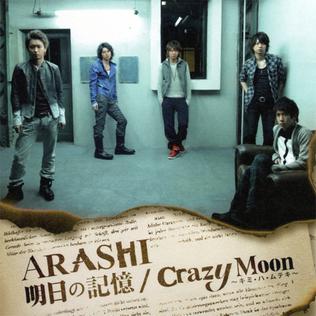
"Ashita no Kioku/Crazy Moon" is a single release by Japanese boy band Arashi. "Ashita no Kioku" was used as the theme song for the drama The Quiz Show 2 starring Arashi member Sho Sakurai,and "Crazy Moon " was used as the theme song for Kose's Esprique Precious cosmetics line commercial. The single was released in three editions:a regular edition containing a bonus track and instrumental versions of all the songs released in the single,and two limited edition both containing a DVD with a music video of one of the A-side tracks.
Tomoko Yoshida is a Japanese writer. She has won the Akutagawa Prize,the Izumi Kyōka Prize for Literature,the Women's Literature Prize,and the Kawabata Yasunari Literature Prize.

Seiko Tanabe was a Japanese author. She graduated from the Department of Japanese Literature of Shōin Joshi Senmon Gakkō. Author of numerous novels,she won the Akutagawa Prize,Yomiuri Prize,and Asahi Prize,and received the Order of Culture for her contributions to literature. The honorific nicknamed the L. M. Montgomery of Japan after her death in 2019.
Yuka Ishii is a Japanese writer. Her book Hyakunen doro won the 154th Akutagawa Prize and the 49th Shincho Prize for New Writers.
Maki Kashimada is a Japanese writer. She has won the Bungei Prize,the Mishima Yukio Prize,the Noma Literary Prize,and the Akutagawa Prize.
Natsuko Imamura is a Japanese writer. She has been nominated three times for the Akutagawa Prize,and won the prize in 2019. She has also won the Dazai Osamu Prize,the Mishima Yukio Prize,the Kawai Hayao Story Prize,and the Noma Literary New Face Prize.
The Zainichicinema refers to the transnational film industry of Japan,South and North Korea. With the main theme on the struggles or experiences faced by the resident Korean community or individuals in Japan,the Zainichi cinema is characterized by a wide range of film genres,which encompass melodramas to Yakuza films.
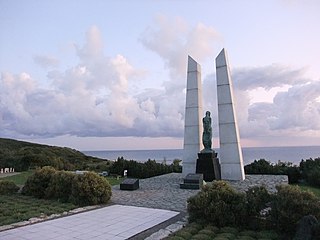
Wakkanai Park was established in Wakkanai,Hokkaidō,Japan in 1961. Covering some 45 hectares,when combined with the adjacent Forest Park,there is total area of approximately 100 hectares for "citizens to relax". Located on a hillside overlooking the Sōya Straits,within the park there are a number of memorials that,along with those of Cape Sōya,that to the Chihaku ferry near the North Breakwater Dome,the Northern Memorial Museum inside the park,and the Wakkanai Karafuto Museum,together help give Wakkanai the greatest density of "proxy" Karafuto lieux de mémoire in Hokkaidō.

Li Kotomi,Li Qinfeng,is a Taiwanese fiction writer,translator,and essayist in Mandarin and Japanese. She is known by her pen name,"Li Kotomi." Her native language is Mandarin Chinese,but her novels are predominantly written in Japanese,and she debuted in 2017. Her literary career began with the Japanese novel titled Hitorimai. It received the 60th Gunzo New Writers' Award for Excellence in 2017. Also,Higanbana ga saku shima received the 165th Akutagawa Prize,which was established in 1935 in commemoration of Ryūnosuke Akutagawa.
References
- ↑ Fukumoto, Yumiko (Winter 1998). "Titles Introduced in Japanese Book News Published in Other Languages 1991–98" (PDF). Japanese Book News. The Japan Foundation. Archived from the original (PDF) on December 13, 2004.
- ↑ Ryang, Sonia (2002-05-01). "Dead-End in a Korean Ghetto: Reading a Complex Identity in Gen Getsu's Akutagawa-Winning Novel Where the Shadows Reside". Japanese Studies. Routledge. 22 (1): 5–18. doi:10.1080/103713902201436714. S2CID 143776148.
- ↑ For general information about the detention camps, see Morris-Suzuki, Tessa. "Invisible Immigrants: Undocumented Migration and Border Controls in Early Postwar Japan". Japan Focus. Archived from the original on 2007-09-28. Retrieved 2006-11-30.
- ↑ Matsuura, Yoshiko (November 2000). "Ethnic Identities and Various Approaches towards Japanese Language: Analysis of Ri Kaisei, Kin Kakuei, and Tachihara Masaaki". Purdue University.
{{cite journal}}: Cite journal requires|journal=(help) - ↑ 「過ちを認め謝罪した金正日の告白を、日本人は歴史認識と平和憲法の精神で受け入れるべき」. Tokyo News (東京新聞)